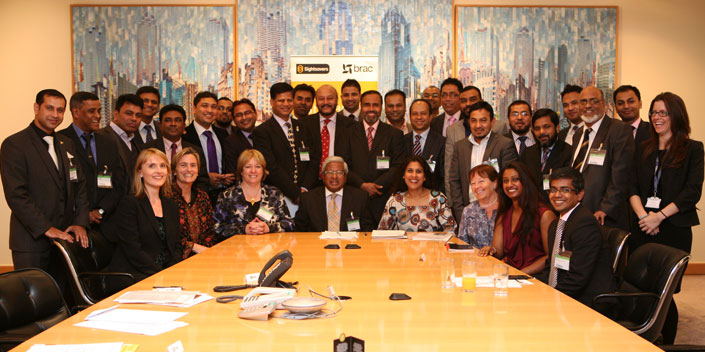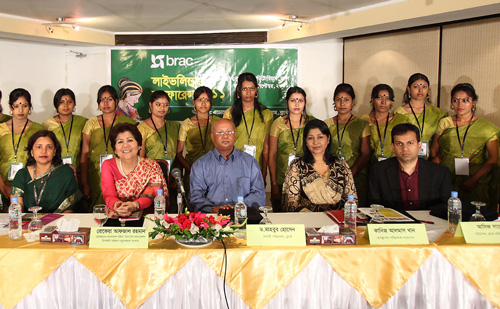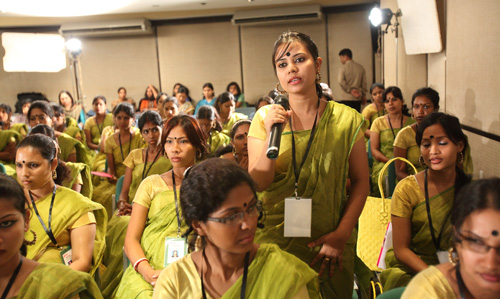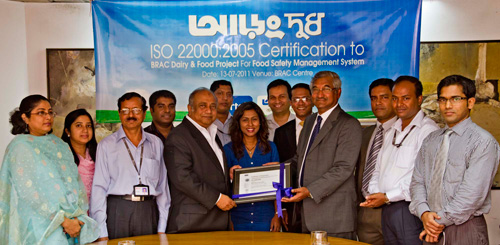
English (961)
Children categories
National start of ‘£1 on the Bill’ campaign for Vision Bangladesh with 300 participating restaurants
27 September 2011, London.

Sir Fazle Hasan Abed, Chairperson and Founder of BRAC, and Dr Caroline Harper, Executive Director of Sightsavers, officially started the £1 on the Bill campaign today at the national committee meeting with leading Asian restauteurs from around the UK.
Vision Bangladesh is a ground breaking partnership between BRAC and Sightsavers – two highly respected international charities. The aim is to eradicate avoidable blindness in Sylhet by 2013 and across the whole of Bangladesh by 2020.
A simple 20 minute operation costing only £20 can change a person’s life forever.
Sir Fazle Hasan Abed, Founder & Chairperson, BRAC comments: “I am so pleased to announce today the start of this innovative campaign that brings together BRAC, Sightsavers, and Britain’s leading Asian restaurants and their customers to eliminate avoidable blindness in Bangladesh by 2020.”
Dr Caroline Harper OBE, Chief Executive, Sightsavers said: “On behalf of Sightsavers, let me say how pleased we are to partner with BRAC on Vision Bangladesh to eliminate preventable blindness in Bangladesh. I am delighted to meet some of our country’s leading restaurateurs here tonight and admire your commitment to this important programme.”
The campaign will run from October 3rd for up to eight weeks in restaurants around the country. The national committee meeting was attended by Vision Bangladesh’s British-Bangladesh regional representatives covering England, Scotland, Wales and Northern Ireland. Each regional representative reported on how many restaurants had signed up for the campaign in their area. To date, the campaign has secured commitments of up to 300 restaurants with more expected to join up in the next week.
Customers at participating restaurants will be given the option of donating £1 per table at the end of their meal. Those not wishing to take part can easily opt out. It is expected that each participating restaurant will be able to raise £1,000 during October and November. 95% of funds raised will go directly to deliver the Vision Bangladesh programme in Sylhet Division, Bangladesh.
Members of the publicn in UK can also donate online at: www.brac.net/visionbangladesh/direct/view/ or by a simple text message. Text BRAC20 and the amount you wish to donate (up to £10) to 70070 (e.g your text could read BRAC20 £10).
In the photo:
Back row from left to right:
Councillor Prince Sadik Chaudhury
Mokhtar Hossain Khokon
M. R. M. Choudhury
Shabbir Ahmed Choudhury
Syed Siddik Ali
Tipu Rahman
Dobir Miah
Abdus Salam
Dr. Wali Tasar Uddin
Ruhi Ahad
Rtn. Abdul Latif JP
Naz Islam
Manchob Ali JP
Councillor Abdul Harid
Azizur Rahman
Muzahid Khan
Mr. Hasan
Mr. Muzahid
Surrey replacement
Akikur Rahman
Hafizur Rahman
Shah F. Athar
Abdul Malek
Rokib Ali
Jessica Merton
Front row from left to right
Penelope Mawson
Susan Davis
Caroline Harper
Sir Fazle Hasan Abed
Simone Sultana
Mary Garvey
Tanha Habib
Tanvir Ahamed
Coming Soon: Book on BRAC's TB Program
Now available: Buy The Book from amazon
Like many of BRAC’s programs, its community-based model for TB has garnered much praise: it’s been profiled in articles in the New York Times, documented in Harvard Business School case studies, received the Stop TB Partnership Kochon Prize, and hosted dozens of distinguished visitors. Some of its methods have brought them under fire, within conservative communities, with the public sector, and international donors—it was one of the first to treat patients with lay volunteers (called shasthya shebikas), all women, in the community. And while medications have always been provided for free by the government, BRAC requires patients to hand over a small deposit prior to beginning treatment that’s returned only when the patient completes the six months of treatment (this can be paid by the community or waived when necessary). Shasthya shebikas watch the patients take their medications every day (a strategy now called directly observed therapy, short-course or DOTS) at their homes, receiving a small payment upon treatment completion.When pressured to change its delivery strategy, BRAC has refused, with one argument amply supported by program data and rigorous research studies: this model works. With adherence as an Achilles’ heel for treating infectious and non-communicable disease alike, BRAC found a way to engage patients and motivate them to continue the full course of treatment, defended it, and then scaled up to one of the largest programs in the world. Now a critical member in a national partnership with the Government of Bangladesh, over 40 other non-governments organizations, BRAC treats close to 100,000 patients a year with a success rate of 92%, defying the assumed trade-off between quality and scale. These achievements reflect significant contributions from many, including technical expertise from the World Health Organization and the Japanese Anti-TB Association, and resource mobilization by the Country Coordinating Mechanism, and transcend national borders.Internationally, BRAC has begun to adapt the model to new contexts. BRAC Afghanistan has worked with the government to make community-based TB treatment options part of the standard package of health services offered nationally.
Since its first write-up in a scientific newsletter in 1991, BRAC has published several academic articles on its successes in tuberculosis. It has even written chapters on the program in Tuberculosis: an interdisciplinary perspective and more recently, in From One to Many, a collection of programmatic experiences in scale up edited by BRAC. Ian Smillie dedicates a chapter of his book on BRAC, Freedom from Want, to tuberculosis control. But a thorough, reflective documentation, one capturingthe broader elements of the history, collective insights, support systems, strategic thinking, and overall, the story of what had built the program, written by its veteran leaders and staff, was absent. Finally, in Making Tuberculosis History: Community-based Solutions for Millions, we have achieved just that. The book offers a complete account of the program: how it was conceived, piloted, refined, scaled, managed, and ultimately adapted for new contexts, including Bangladesh’s rapidly growing citiesand Afghanistan’s remote mountainous regions. Summarizing past successes and current dilemmas, the book’s ultimate aim is to advance efforts to eliminate poverty and disease globally. The public health challenges facing the world today demonstrate the critical need for large-scale thinking; lessons from BRAC’s TB program can inspire others to think creatively about health delivery and advancing towards health for all.
Making Tuberculosis History will be formally launched on October 27th at the 42nd Union World Conference on Lung Health. All conference participants are welcome to attend. BRAC plans to hold additional book launch activities in Dhaka, New York, Boston in the coming months. Those interested in purchasing the book can find information at the University Press Limited website.
Buy The Book from amazon
Livelihood Conference 2011 by Adolescent Development Programme (ADP)

14 September 2011, Dhaka. ADP trained 500 adolescents on facial, hair cut, bridal make up and other beauty enhance activities so that they can start beauty parlor business from their home. Among them seventy successfull adolescents were invited in this conference to enrich their knowledge in this business. Kaniz Almas Khan - Managing Director of Persona took a session where she gave them tips on how to run business. Mamun Rashid – Professor of BRAC Business School talked on how to attract new customer and work on experienced employee retention. Asif Saleh – Director of BRAC Communications and Shameran Abed - Programme Head of BRAC Microfinance Programme discussed with them about financial need and support. Rashida Parveen - Programme Manager of BRAC Adolescent Development Programme took an interactive session where girls shared their work related experiences and asked for guidance. Rokeya Afzal Rahman, Chairman- Bangladesh Federation of Women Entrepreneurs mentioned that girls can do multitasking very well. Besides building career, family should be first priority in a girl’s life. Dr. Mahbub Hossain - Executive Director of BRAC mentioned that without economic development of women, our country cannot move forward.

Lady Sarwat Abed - Director of CFL BRAC University, Dr. Safiqul Islam – Director of BRAC Education Programme, Md. Monowar Hossain Khondakar - Programme Coordinator of BRAC Education Programme, Dr. Obaidur Rob Chowdhury - Chairperson of UCEP, Munni Saha - Chief Editor of ATN News channel were also present in the event. At the end of the event all participants received certificates.
BRAC Chair speaks at Clinton Global Initiative
Tune in on Thursday, September 22, 2011 at 12:15 pm (ET) to see BRAC Founder and Chairperson Sir Fazle Hasan Abed speak on the "What to Scale, When to Scale" panel at the 2011 Clinton Global Initiatives.
Have something to say? Join the conversation on Twitter by including @bracusa and #cgi2011 in your tweets, or leave a comment on our Facebook page.
Roundtable discussion titled ‘Vagrants and Shelterless Persons (Rehabilitation) Act 2011’
17 September 2011, Dhaka. BRAC’s Human Rights and Legal Aid Services (HRLS) Programme in association with partners Ain o Shalish Kendra (ASK), Bangladesh Legal Aid Services Trust (BLAST), Nijera Kori, and Action on Disability and Development (ADD) organised a roundtable discussion titled ‘Vagrants’ and Shelterless Persons (Rehabilitation) Act 2011 to address and protest the gaps that the current law comprises especially in light of upholding human rights of this vulnerable community.
The event was held at the Reporters’ Unity at Shegunbagicha, Dhaka and was presided over by Chief Guest, Dr. Mizanur Rahman - Chairman of the National Human Rights Commission (NHRC). The Chair of the session, Khushi Kabir - coordinator of Nijera Kori, along with distinguished panelists presented a set of recommendations to revise the current rehabilitative law which will be submitted to the parliamentary standing committee responsible for reviewing the Act before presenting it to Parliament.
As one of the esteemed panelists during an open discussion at the Roundtable, Dr. Faustina Pereira - Director, HRLS Programme expressed her concern for both the process through which this Act has been passed and its content which is disgraceful and humiliating for deprived and dispossessed sections of citizens. Along with this, she urged that the law be accessed through initiating consultations with affected persons, practitioners and agencies involved in providing support to the poor.
Eve teasing is undeniably a form of Sexual Harassment- Unite against it!
13 September 2011, Dhaka. Chief Guest of the Seminar titled “Role and experience of teachers-guardians in eradicating sexual harassment’’ ycleped Eve teasing a certain form of sexual harassment and called on to come together building social awareness. The seminar was organised today by MEJNIN Programme under BRAC Gender Justice and Diversity Unit at BRAC Center. The seminar was chaired by Education Minister of the Government of Peoples Republic of Bangladesh. He also stated ‘The term ‘Eve-teasing’ does not reveal the degree of harassment it causes to the girls and the teasers should be treated as criminals. Education Ministry has taken steps to prevent sexual harassment. To eliminate this ailment from the society we have to change our perception. Our next generation will grow up with stronger moral values introduce by advanced curriculum and only then we will be able to eradicate recurrence of sexual harassment from the society.’
The Deputy Minister of the ministry of children and women affairs, Dr. Shirin Sharmin Chowdhury was the Special Guest of the Event. Dr.Shirin Sharmin Chowdhury said, ‘Women are facing harassment in everywhere -their work places, in educational institutions, on the way to their school, colleges. We have to change our society’s overall approach towards the women and that has to be incorporated through introducing new national curriculum and legislative decree. Government is considering formulating law against ‘eve-teasing’ and in future further initiatives will be taken such as forming sexual harassment elimination committee, in every ministry and institutions.
The programme was addressed by Principal Kazi Faruk Ahmed chief co-ordinator of Jatiya Shikkhak Karmachary Front, directed and key note presented by Sheepa Hafiza, Director BRAC Gender Justice and Diversity and presided by BRAC Executive Director Dr. Mahbub Hossain.
Teacher, students and guardians from different schools of Dhaka was present at the programme.
Celebrating International Youth Day in Uganda
Arua, in the West Nile region of Uganda was the host of this year's International Youth Day celebrations, which was presided over by His Excellency General Y.K. Museveni, President of of the Republic of Uganda. Youth groups and adults came from all over the country for the event, including members from BRAC Uganda who travelled to Arua to join in and see how lessons from BRAC could fit in with this year's theme, Accelerating Youth Empowerment through Skills Development.
The day commenced with cultural performances from youth across the country who filled the stadium with color, dancing, and singing. Youth delegations came from far and wide and were joined by fellow youth, politicians, senior civil servants, foreign diplomats, donors, NGO staff, and members of civil society. Participants also included local celebrities Dorcus Inzikuru (aka the "Golden Gazelle," Uganda's fastest runner) and Bobbi Wine (aka the "Ghetto President," a popular singer) to inspire the youth with their success.
Uganda has the world's youngest population and the highest prevalence of poverty among its youth. Over half of its population is under the age of 18, and 94 of its young people live on less than US$2 a day. Skills development was chosen by the government as this year's theme in Uganda to help address the youth unemployment problem in the country. Youth face large barriers to securing stable employment given limited job opportunities and for many, inadequate skills and education. Skills development, therefore, is critical to assist youth in in the transition to work, equip them with the skills to become job creators, rather than seekers, and to allow youth greater participation in the social and economic transformation of Uganda. One of the many questions asked on the day was what strategies and programs do we put in place to do this?
BRAC Uganda has been developing the skills of young men and women in Uganda since 2008, when it launched its Empowerment and Livelihoods for Adolescents (ELA) program, offering adolescents and young girls a safe space in which they can socialize and be provided with life skills training, financial literacy training, livelihoods training, vocational training, and access to microfinance. The clubs, launched in partnership with the MasterCard Foundation, reach nearly 28,500 adolescent girls through the 743 clubs in 26 districts of Uganda. More recently, BRAC has launched two additional programs for youth skills development and empowerment, making youth one of its key focal areas. In 2010, BRAC supported 278 young men and women to undergo vocational training at registered institutes under their vocational training program, offering them assistance afterward with job placement, tools to generate self-employment and formal certification of their course. In addition, 2011 marked the opening of 120 Youth Centers in partnership with UNICEF in the Karamoja Region of North Uganda. Through this initiative, nearly 3,000 young women will have access to skills training and some initial input supply for becoming self-employed in the trade they have learned. To celebrate International Youth Day, UNICEF has created a video to highlight how youth supported by BRAC's initiatives are overcoming various barriers.
BRAC's work with youth has led us to recognize the need for a deeper understanding of the complex challenges they face as they negotiate the transition to adulthood. In light of this, the Research and Evaluation Unit has undertaken a large nation-wide research study on youth, to be launched soon in November 2011. Combining a nationally-representative survey of 5,000 youth with in-depth qualitative research methodologies, the report will provide a dynamic understanding of the experiences and aspirations of youth, and identify the forms of support that have allowed youth in Uganda to overcome these challenges, providing important lessons on how to adopt policies and programs to the needs, preferences and priorities of youth.
Property rights awareness for the poor and marginalised
11 August 2011, Dhaka. The pathways for the poor and marginalised to access property and other fixed assets as a significant human right, was widened when the second batch of HRLS Upgrade Sheboks successfully completed and graduated from a comprehensive government certified land measurement training course on the 7th of August 2011. This residential training course began on July 3rd 2011. It has already graduated 32 Upgrade Sheboks in the previous batch to this end.
The training module is a unique triple layered component of the Property Rights Initiative. This project is currently being piloted in Rangpur and Gaibandha districts under the corroborative direction of BRAC HRLS, Omidyar Network and BRAC USA. The project aims to actively realize the claims of vulnerable communities to property and other fixed/productive assets via legal education, community outreach efforts, and a land measurement model as highlighted above.
With their new skill set, the group of freshly trained land measurers, can more effectively provide specialized land measurement services and become community advisers who can impart free information and knowledge about property rights issues throughout the community.
Both the training and certificate distribution ceremony were held at Rangpur's BRAC Learning Center (BLC). Distinguished figures from the community such as Chief Trainer and Rangpur BLC in-charge, Md. Yaqub Ali, presented the graduates with their certificates, Chief Guest and president of Raja Ram Mohon Club, Rangpur, Md. Monwar Hussain, and Special Guests, Advocate Kamal Kumar Mojumder, and BRAC Microfinance Regional Manager, Md. Delowar Hossain all graced this event with their presence.
Aarong Milk gets ISO: 22000 Certification

25 July 2011, Dhaka. Aarong Milk has now achieved the International benchmark of quality by getting the ISO 22000: 2005 certification for food safety management.
Aarong Milk was first marketed in 1998 by BRAC dairy - a dairy social enterprise of development organization BRAC, to help poor rural dairy farmers protect and grow their dairy enterprises and improve their family’s income by facilitating access to urban markets. Inspired by this purpose, Aarong Milk has worked to build a brand that is as true to its urban consumers as it is to rural suppliers, providing dairy products of impeccable quality that drive its vision of a healthy and strong Bangladesh. As a part of its’ quality commitment, Aarong Milk has ISO 22000 certification to strengthen the consumer’s confidence.
Mr. Muhammad A (Rumee) Ali, Managing Director, BRAC Enterprises & Investments received the ISO 22000: 2005 certificate on behalf of BRAC Dairy from Mr. Zulfiquar Rahman, Founder Chairman of Intertek, a leading provider of quality and safety solutions worldwide. Ms. Tamara Abed, Director- BRAC Dairy and Mr. Ronald Biswas, Country Manager- Intertek were also present along with other high officials of BRAC Dairy & Intertek.
ABOUT INTERTEK
Intertek is a leading provider of quality and safety solutions serving a wide range of industries around the world. From auditing and inspection, to testing, quality assurance and certification, Intertek people are dedicated to adding value to customers' products and processes, supporting their success in the global marketplace. Intertek has the expertise, resources and global reach to support its customers through its network of more than 1,000 laboratories and offices and 30,000 people in over 100 countries around the world. Intertek Group plc (LSE: ITRK) is listed on the London Stock Exchange and is a constituent of the FTSE 100 index. Visit: www.intertek.com
13 million people in Bangladesh lifted out of poverty
02 August 2011, New York. This June the Bangladesh Bureau of Statistics released the preliminary report from its 2010 Household Income and Expenditure Survey. The report indicates that in the period from 2005 to 2010, 13 million people have been lifted out of poverty and that the overall poverty level has fallen by 8.5 percentage points.
"Bangladesh is truly an amazing story of human progress, despite the obstacles," said Dr. Lincoln Chen, Chair of the BRAC USA Board of Directors and President of the China Medical Board of New York. "Surely the large NGOs like BRAC deserve much credit."
Additional survey findings pointed to significant increases in a number of important poverty indicators. Individuals per capita, per day intake of food has increased by 5.5 percent, from 947.8 grams in 2005 at the national level, to 999.9 grams in 2010. Quality of life has improved as well. The survey found significant increases in access to safe drinking water and electricity. A phenomenal increase was observed in the use of mobile phones, with an increase from 11.29 percent in 2005, to 63.74 percent in 2010.
Average monthly household income has increased by 59.38 percent at the national level, 58.27 percent in rural areas, and 57.48 percent in urban areas. A large increase was also seen in average monthly household expenditures, with an increase of 82.59 percent at the national level, 80.71 percent in rural areas, and 82.01 percent in urban areas, compared to 2005.
The report also referenced significant improvements in education, with increases in the literacy rate of 7-year-olds increasing from 57.91 percent at national levels, compared to 51.9 percent in 2005. The proportion of people benefiting from at least one public safety net program has increased as well. In 2010, 24.57 percent of households reported having received a benefit during the past year from at least one type of program, compared to only 13.03 percent in 2005.
BBS Director General Shahjan Ali Molla said the survey was conducted in 12,240 households, including 4,400 in urban areas, and 7,840 in rural areas across the country from Feb. 1, 2010 to Jan. 31, 2011.
Join the world’s biggest family




